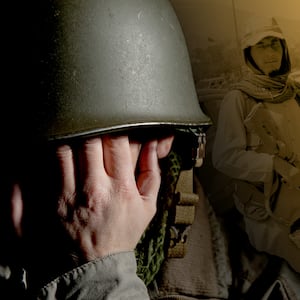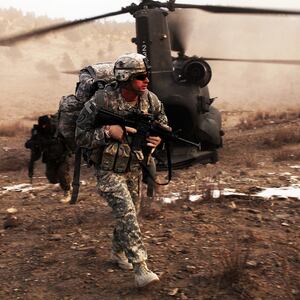In the chaotic final days of the war in Afghanistan, veterans have been huddling around kitchen tables and living room command centers trying to evacuate allies and interpreters who worked for the U.S. And these emotional days and desperate evacuation efforts are taking a heavy psychological toll—with calls to suicide hotlines up and veterans of the war in Afghanistan openly admitting that they’re facing some of their darkest days.
Already, some who were deployed to Afghanistan have died by suicide over the last few turbulent weeks.
One of those people is Mark Longley, who worked for the Department of Defense in Afghanistan from 2012 through at least 2014. He died by suicide on Aug. 14, his friends told The Daily Beast.
One of Longley’s former colleagues—Andrew Strutt, who worked on cybersecurity for the Army in Iraq and Afghanistan—said he didn’t know exactly what triggered his friend’s suicide.
“But I know that he believed in what we did out there and he was a hard worker and he talked about his wife all the time, and he loved her incredibly,” Strutt said. “And he was loved by family and friends. I feel bad I couldn’t do anything for him. I just didn’t know.”
Following the news of Longley’s death, Strutt and friends reached out to everyone they knew who served with Longley to check in on their mental health and see how they were handling the fall of Kabul.
“For about a week, I spent as much time as I could reaching out to all of my former colleagues and associates in the services and let them know that I’m thinking about them and to be there if they need someone to talk to,” Strutt said.
He added that veterans and other civilians who served in Afghanistan might still be turning inwards when what they might need is to talk and connect. “There are some who are just so battle-hardened they just won’t admit [their feelings]—they say it’s no big deal. They put on a stone-cold, non-reaction to it,” Strutt said.
The mental health toll of the Taliban’s rapid takeover of Afghanistan has weighed heavy on veterans who may be having suicidal thoughts, according to the Veterans Affairs Department’s national director for suicide prevention, Matthew Miller.
The VA told The Daily Beast that, as of Aug. 25, the Veterans Crisis Line had received approximately a 6 percent increase in calls since Aug. 13, when news broke that the Taliban had gained control of half of Afghanistan’s provincial capitals.
On Aug. 16, the day after Kabul fell to the Taliban, the Veterans Crisis Line received a nearly 12 percent increase in calls, compared to the volume of calls last year on the same day. On Aug. 25, the call line had a 17 percent increase compared to the previous year. Miller clarified that the VA doesn’t know if the uptick is directly attributable to the situation in Afghanistan, and attributing any suicide to one particular cause vastly oversimplifies complex mental health challenges.
But it’s clear that many veterans are struggling to watch a country that they fought in for 20 years now fall to the Taliban.
For some who have been against the war, watching the withdrawal spiral out of control has reaffirmed those concerns that blank check military authorizations may have been a mistake from the outset, and raised questions about whether any of the military deployments since were worth it.
The nonprofit group “Stop Soldier Suicide” has also seen a rise in requests for help. Stop Soldier Suicide is “projecting a 15-20% increase in requests in August, as a result of the crisis in Afghanistan,” Tina Starkey, Stop Soldier Suicide’s chief growth officer, told The Daily Beast.
Over the previous two weekends—times when Stop Soldier Suicide typically sees the most help requests—requests were up by 90 percent and 60 percent, respectively, compared to historical averages.
Craig Gridelli, one of the co-founders of Stop Soldier Suicide, told The Daily Beast he suspects there will be some time before the data on call-ins reflects the true mental health toll of the moment.
”I think it’s early to really assess the mental health impacts of this sort of thing,” Gridelli said. “I don’t think mental health in many cases is something you can say ‘This event happened then the next day… this mental health result.”
“It’s much more like it festers for a period of time, it weighs on you, then you reach out,” he added.
National suicide rates have been on the rise in recent years, according to data from the National Institute of Mental Health. The suicide rate for veterans was 1.5 times that of non-veteran adults, after adjusting for age and sex, according to the most recent annual VA report on suicide prevention published last year, which details data from 2018.
And while the VA hasn’t yet published comprehensive data from 2020 or 2021, individual reports from Veterans Health Administration sites show an increase of on-campus suicides from January of 2020 to September of 2020, according to the VA Office of Mental Health and Suicide Prevention monitoring of VHA site reports and administrative data.
The increase in rates of suicide for veterans and active-duty personnel outpace that of the general population, according to both the VA and a study by the Costs of War Project published in June.
Many veterans have been questioning if their service was all for nothing and whether their friends lost their lives in combat in vain. Many others are grappling with numbness—anger, with the idea that the U.S. military has abandoned the very Afghans they were deployed to protect for nearly two decades.
Floyd “Shad” Meshad, a licensed clinical social worker and founder of the National Veterans Foundation, said soldiers and veterans are already grappling with the toll that war takes on mental health. The way the U.S. has conducted its withdrawal—leaving so many allies in harm’s way, and leaving veterans almost entirely unable to help—has only exacerbated those mental health issues.
“This is just pouring gas on the fire,” Meshad, a Vietnam veteran who served as a counselor for veterans in Vietnam, told The Daily Beast.
Meshad, who works with veterans grappling with the fallout of the Afghanistan withdrawal, admitted that in recent days he has found himself somewhat at a loss.
”It’s making it very difficult for us to present any light at the end of the tunnel in this reality,” Meshad said. “I’m a mental health therapist… and I don’t know what to tell them. It’s hard to explain… there’s really no answers.”
Many veterans of the war in Afghanistan acknowledge that they’re in one of their darkest moments.
“I’m talking to other soldiers and morale is at an extreme all time low. We let the Afghans down,” said Dave Kennedy, a Marine who served two tours in Iraq. “We understand that it’s out of our control. It’s a policy decision. [These are] things that are well above our pay grade. But at the end of the day, we were there to protect these people, and we’re no longer there to protect them from the horrors and atrocities that we’re going to see from the Taliban.”
He continued that he was not someone who typically cries—“it’s not a thing I’m proud of or whatever, it’s just kind of who I always have been, I’m not a crier”—but Kennedy said he had “shed more tears over the last week than I have my entire life.”
Nick Black, who deployed to Afghanistan with the 173rd Airborne, told The Daily Beast the fall of Kabul had made it difficult to tap into his emotions.
“I’ve been struggling to turn emotions on since the military… where I don’t feel anything. I was getting a lot better, and [Sunday] I just went completely numb,” Black said. “I haven’t felt that way in a long time. It was just very difficult to process.”
Miller, the VA’s national director for suicide prevention, urged veterans to reach out for help and to remember they’re not alone in feeling a range of emotions, from apathy to anger, as the chaos continues in Afghanistan.
“It can be, for most people, extremely helpful from a balance perspective to bounce the thoughts, bounce the feelings off another person,” said Miller, who holds a PhD in psychology and Master in Public Health in health care administration. “Sometimes we… veterans may not want to do that with the people around them and they may prefer to do that in a confidential and even an anonymous way through the Veterans Crisis Line.”
Paul Rieckhoff, who founded the veterans group Iraq and Afghanistan Veterans of America, said therapy has been key to him for taking care of his mental health over the years.
“I still go to therapy every week. Therapy for me is like working out my body. It’s important to me—it keeps me healthy,” Rieckhoff, an Army veteran, told The Daily Beast. “It’s like working out… If you miss therapy, you’re not going to be as healthy… And it’s not always easy, you don’t always find the best therapist the first time… You’ve got to stick with it.”
Isolation during this difficult time is also a problem. Particularly during the ongoing pandemic, the VA warns in its suicide prevention report that isolation is “a significant concern given social distancing practices to reduce the spread of COVID-19.”
For family and friends of veterans that are dealing with potentially suicidal thoughts or ideation, instead of avoiding the topic of suicide, talking it out can actually be helpful, Miller said.
“It’s easy and pretty common to think that if you ask someone if they’re thinking about killing or hurting themselves, that you may plant a thought that’ll make things worse. And actually what you’re doing with that is you’re opening the door to talk. You’re opening the door to be honest. And you’re the one that’s willing to go there first,” Miller told The Daily Beast.
Miller urged loved ones to be in tune with any potential mood, sleep, and appetite changes as well.
“Know the signs: I think watching for significant changes is really important—significant changes in sleep, changes in interest, like things you’re normally interested in you’re not interested any more [or] apathetic,” Miller said. “Significant changes in mood, [for example,] you’re just not the same person. Significant changes in appetite, in diet, those sorts of things can be key indicators to pay attention to.”
For some, dealing with the withdrawal has meant banding together on social media with other veterans to discuss their feelings.
“We’re all out there picking our troops up… we’re all just working through our experiences together—talking and sharing,” Kennedy said, noting that when one veteran posted he was having suicidal thoughts, Kennedy hopped on a call with him to calm him and connect him with resources and professional help.
“We’re making sure we have each other’s backs like we do in the military. Even when we get out, we always have that mission.”
In the absence of clear evacuation procedures and chaos at Hamid Karzai International Airport, veterans have also been banding together in recent days, working old contacts to evacuate interpreters and those who worked for U.S. and allied forces in Afghanistan. They’re coordinating the so-called ‘Digital Dunkirk’ with minimal help from the U.S. government.
“The government is not saving our friends, and so we’re doing it ourselves,” Rieckhoff said. “And I think that’s compounding a feeling of betrayal and isolation.”
In the coming days, Meshad says that as the situation on the ground deteriorates, more and more veterans will likely struggle with mental health crises, and possibly suicidal thoughts, especially as the nominal Aug. 31 deadline for foreign forces to evacuate Afghanistan approaches.
“That’s really going to set off another wave of suicide and massive depression, because a lot of people, these allies, they became brothers, they became brothers in combat,” Meshad said.
For now, Rieckhoff said finding hope and connecting with others will be crucial for veterans working through their emotions about Afghanistan.
“That’s what I would encourage people to do is find connection, find hope, and a mission.”
Veterans who are in crisis or having thoughts of suicide, and those who know a veteran in crisis, should contact the Veterans Crisis Line for confidential crisis intervention and support available 24 hours a day, 7 days a week, 365 days a year. Call 1-800- 273-8255 and press 1, text to 838255, or chat online at VeteransCrisisLine.net/Chat









